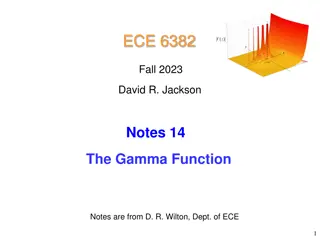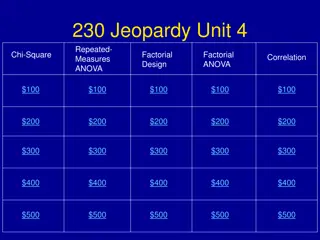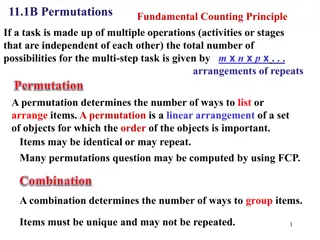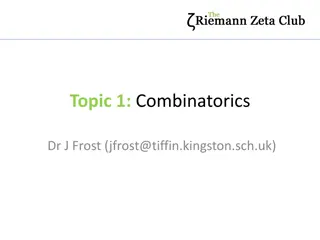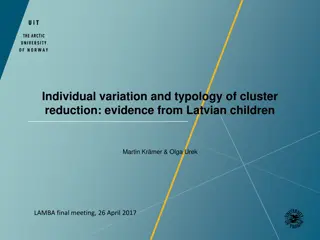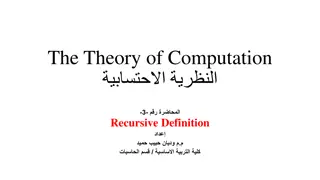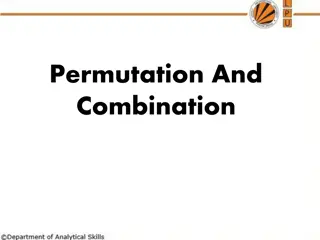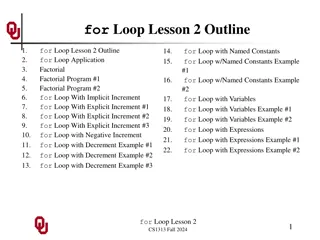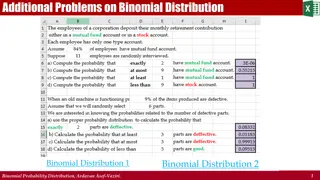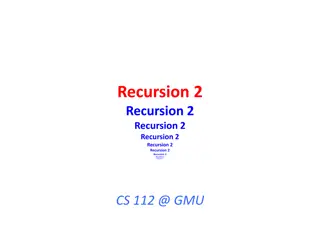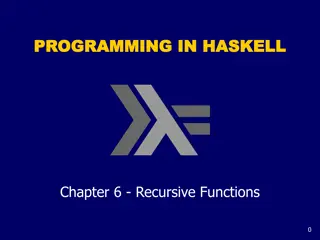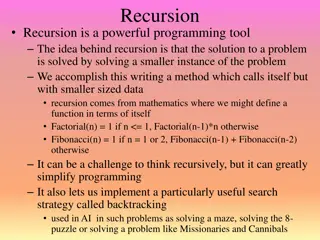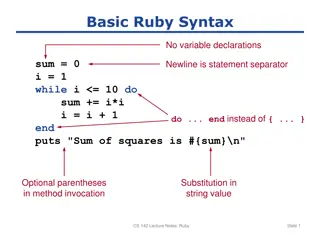Factorial Designs in Experiments
Factorial designs in experiments allow researchers to study the effects of multiple independent variables simultaneously. This type of design enables the examination of main effects and interactions between factors, providing a comprehensive understanding of the research variables. Main effects refe
1 views • 25 slides
The CLEAR Trial: Investigating Hypertonic Saline and Carbocisteine in Bronchiectasis
The CLEAR Trial is a 2x2 factorial randomized trial evaluating the effectiveness of hypertonic saline and carbocisteine for airway clearance in bronchiectasis over 52 weeks. Led by Professor Stuart Elborn and Professor Judy Bradley from Queen's University Belfast, the trial focuses on clinical and c
2 views • 23 slides
Introduction to Gamma Function and Equivalent Integral Forms
The Gamma function is a versatile mathematical function that generalizes the factorial function to non-integer and complex values. It has various integral definitions such as the Euler-integral form. The proof of the factorial property of the Gamma function is demonstrated through analytical continu
1 views • 20 slides
Fish Breeding Mating Strategies and Designs for Effective Population Management
Designing mating strategies to maximize the effective breeding population in fish hatcheries is crucial for maintaining genetic diversity and overall fitness. Random mating, simple paired mating, factorial mating, and other breeding designs are discussed to help hatchery managers improve breeding co
5 views • 13 slides
Efficient fMRI Experimental Design: Maximizing Neurovascular Response
Understanding the importance of correctly designing fMRI experiments is crucial for testing specific hypotheses by manipulating stimulus types, timing, and participant instructions. Types of experimental designs include categorical, factorial, and parametric designs, each serving different purposes
0 views • 35 slides
The CLEAR Trial: Investigating Hypertonic Saline and Carbocisteine in Bronchiectasis
The CLEAR Trial is a 2x2 factorial randomized trial examining the effectiveness of hypertonic saline and carbocisteine for airway clearance in bronchiectasis over 52 weeks. Led by Professor Stuart Elborn and Professor Judy Bradley from Queen's University Belfast, the study focuses on exacerbation ma
2 views • 16 slides
Recursive Algorithms in Computing
Explore recursive algorithms in computing, including the definition, examples like factorial, exponentiation, GCD, and modular exponentiation. Dive into the concept of solving problems by breaking them into smaller instances, ensuring termination with known solutions.
1 views • 16 slides
Statistical Analysis Review - An Overview
Explore a diverse range of statistical topics including Chi-Square, Repeated Measures ANOVA, Factorial Design, and Correlation. Learn about scale measurement requirements for Chi-Square, assumptions violation, effect size measures, within-subjects design considerations, and more.
1 views • 51 slides
Counting Rules and Probability in Mathematics
The content delves into fundamental counting rules such as the Fundamental Counting Rule, Permutation Rule, and Combination Rule to help determine the number of possible outcomes for sequences of events. Factorial notation and permutations are also explained, along with examples to illustrate their
0 views • 24 slides
Permutations in Mathematics
Permutations in mathematics involve arranging items in a specific order, considering factors like repetitions and groupings. Different scenarios are explored, such as selecting friends for lunch, arranging letters in words, and creating lists of favorite books. Formulas and strategies for calculatin
0 views • 14 slides
Recursive and Iterative Factorials through Tracing
This content provides an in-depth exploration of recursive and iterative factorial functions through tracing examples. The explanations are accompanied by visual aids to help conceptualize the iterative and recursive processes of calculating factorials. By comparing the two methods side by side, rea
1 views • 7 slides
Influence of Competition, Cooperation, and Violent Video Games on Prosocial Behavior
This study explores the impact of competition, cooperation, and violent video games on prosocial behavior. The research investigates the relationship between different types of video games and their influence on aggression and bias. Using a 2 by 2 factorial design, voluntary students from MSUM parti
0 views • 7 slides
The CLEAR Trial: Investigating Hypertonic Saline and Carbocisteine for Bronchiectasis
The CLEAR Trial is a 2x2 factorial randomized trial led by Professor Stuart Elborn and Professor Judy Bradley to assess the effectiveness of hypertonic saline and carbocisteine for airway clearance in bronchiectasis patients over 52 weeks. The trial involves various study sites and potential new sit
0 views • 30 slides
Combinatorics Fundamentals with Dr. J. Frost
Delve into the realm of combinatorics with Dr. J. Frost as your guide. Discover key topics like slot filling, factorial and permutation functions, distinguishable vs. indistinguishable objects, recurrence relations, compositions, and partitions. Uncover the art of counting and arranging objects with
1 views • 75 slides
Special Topics in Design: Factorial Experiments and Fractional Designs
This content delves into the world of factorial designs used in design experiments to identify important factors and interactions. It explores 2k full factorial designs and their application in screening potential factors. Additionally, the content discusses 2k-p fractional factorial designs and the
1 views • 19 slides
Evidence of Cluster Reduction in Latvian Children
Investigation explores errors in L1 acquisition of complex word-initial onsets in Latvian children, examining the role of sonority, constraints on complex onsets, and factorial typology of OT constraints. Data from the LAMBA phoneme test with 20 Latvian-speaking children highlights various cluster t
1 views • 18 slides
The CLEAR Trial: Investigating Hypertonic Saline and Carbocisteine for Bronchiectasis Patients
The CLEAR Trial, led by Professor Stuart Elborn and Professor Judy Bradley, aims to assess the clinical and cost-effectiveness of hypertonic saline and carbocisteine for airway clearance in bronchiectasis patients over 52 weeks. The trial involves a 2x2 factorial design and various study sites acros
0 views • 23 slides
Introduction to Recursive Definitions in The Theory of Computation
Explore recursive definitions in the realm of computation theory through examples like defining sets of even numbers, factorial language, palindrome strings, and more. Learn how to prove properties using recursive rules and construct languages with specific patterns and constraints.
0 views • 10 slides
Permutations and Combinations in Mathematics
Permutations and combinations are fundamental concepts in mathematics that test logical reasoning and problem-solving skills. This article covers the basics of permutations, combinations, factorial, fundamental counting principles, and example questions to help you grasp these concepts effectively.
1 views • 86 slides
The CLEAR Trial: Investigating Hypertonic Saline and Carbocisteine for Bronchiectasis Treatment
The CLEAR Trial is a 2x2 factorial randomized trial assessing the clinical and cost-effectiveness of hypertonic saline and carbocisteine for airway clearance in bronchiectasis patients over 52 weeks. Led by Professor Stuart Elborn and Professor Judy Bradley, the trial involves randomization, sealed
0 views • 8 slides
Pharmacovigilance Guidelines for Clinical Trials in Bronchiectasis Research
The CLEAR Trial is a 2x2 factorial randomized trial evaluating the effectiveness of hypertonic saline and carbocisteine for airway clearance in bronchiectasis patients. The trial, led by Professor Stuart Elborn and Professor Judy Bradley, focuses on pharmacovigilance activities, adverse event defini
0 views • 20 slides
Factorial and Permutations with For Loop in C
Learn about the concept of factorial, permutations, and how they are calculated using a for loop in C programming. Explore different examples and programs to understand the application of for loops in calculating the number of orders in a line of students waiting for tickets.
1 views • 22 slides
Recursion in Programming
An exploration of recursion in programming, focusing on the concept of defining something in terms of itself, the importance of base and recursive cases, and the top-down approach to problem-solving. Examples include the factorial function and walking to a door using recursion-based steps.
0 views • 31 slides
Binomial Distribution: Examples and Visualizations
Explore various problems and examples related to the binomial distribution, including calculating probabilities, approximations using Poisson distribution, and visual representations. Discover how binomial distribution tends towards normal under different conditions and learn how to solve problems u
2 views • 9 slides
Recursion: A Fundamental Concept in Computer Science
Recursion is a fundamental concept in computer science that involves solving problems by breaking them down into smaller, similar subproblems. This content delves into the basics of recursion, highlighting key components such as the recursive case and base case. It also explores the concept of facto
2 views • 35 slides
Impact of Stereotypes on Perceived Facial Threat in Women Offenders
Facial expressions play a significant role in understanding emotions, but stereotypes can influence how people perceive facial affect. This study examines how reading tabloid articles about crimes committed by dark and light-skinned women offenders affects the perceived facial threat. Using a 2x2 fa
0 views • 9 slides
PROGRAMMING IN HASKELL
Defined recursively, Haskell functions like factorial and product can be expressed elegantly. Discover the power of recursion for defining and proving properties of various functions.
0 views • 22 slides
Power of Recursion in Programming
Recursion is a powerful tool in programming, solving problems by breaking them down into smaller instances. It simplifies coding and enables algorithms like backtracking in AI. Learn how recursion works and see examples of implementing recursive solutions, like factorial calculations. Understand the
0 views • 46 slides
Basic Ruby Syntax
This content provides insights into Ruby programming syntax, including variable declarations, naming conventions, string syntax, arrays and hashes usage, control statements like if and while, factorial implementation, and handling arguments with defaults and variable arguments. It covers fundamental
0 views • 13 slides
More Counting
Announcements for CSE 312 Summer Lecture 2 with topics on permutations, combinations, and the binomial theorem. Explore sequential processes, factorial concepts, and dense questions in combinatorics. Understand the importance of order, distinct elements, and the universe of allowed elements in count
1 views • 44 slides
Recursive Functions in ANSI C: Understanding the Basics
Recursion is a fundamental concept in programming, particularly in ANSI C. This content delves into recursive functions, showcasing examples of factorial and Fibonacci functions with explanations and recursive evaluations. It also discusses the iterative version of the Fibonacci sequence and explore
0 views • 9 slides
Recursive Functions in C Programming
Recursion in C allows functions to operate on themselves, leading to concise and understandable forms. This post covers examples of recursive functions like factorial and Fibonacci in C programming, exploring the concept and benefits of recursion over iteration.
0 views • 10 slides
Peer Instruction Materials in C++: Recursion and Factorial
Dive into the world of peer instruction materials for C++ by Cynthia Bailey Lee, exploring topics like recursion, factorial, and computer memory. Understand the concepts through interactive visuals and exercises. Discover the excitement of recursion and unravel the factorial mysteries through code e
0 views • 33 slides
Assembly of Tears: Week 7 Tutorial on Factorial Computations
Dive into the world of factorial computations with a focus on head and tail recursion techniques. Explore the toolbox for efficient coding practices and discover the power of implementing factorials using iterative, head, and tail recursion methods.
0 views • 27 slides
FACTORIAL ANOVA
Dr. Petrov plans an experiment to study the impact of teaching methods and sex differences on learning outcomes using factorial ANOVA. The design includes row and column factors, with different levels for each, to analyze the data effectively. The means tables provide a summary of the experiment's d
1 views • 58 slides
Factorial ANOVA Experiment Analysis
Dr. Petrov is exploring the impact of teaching methods and sex differences on learning outcomes through a factorial ANOVA experiment. The study involves different factors such as teaching method, sex, and student participation, aiming to assess how these variables interact and influence the results.
0 views • 36 slides
Factorial ANOVA: Understanding Experimental Design
Factorial ANOVA, Experimental Design, Analysis of Variance, Learning Outcomes, Research
0 views • 51 slides
Understanding For Loops: Factorial Program Examples
Explore the concept of for loops with factorial program examples, learning how to calculate permutations and different orders of students in a line. Dive into for loop applications and step-by-step guides for better understanding. Get insights into increment, decrement, named constants, variables, a
0 views • 22 slides
Recursive Functions and Iteration Comparison
Learn about recursive functions, specifically focusing on the concept of Factorial, and understand the key points to consider when implementing recursion. Explore how recursion differs from iteration, ensuring progress towards a base case and avoiding infinite looping scenarios. Images included illu
0 views • 11 slides
Efficient Analysis of Factorial Experiments in R with afex Package
Explore the capabilities of the afex package in R for analyzing factorial experiments conveniently. Learn about ANOVA specifications, obtaining p-values for GLMMs and LMMs, comparing vectors, default coding in R, and alternatives to aov function. Enhance your statistical analysis skills for factoria
0 views • 33 slides


